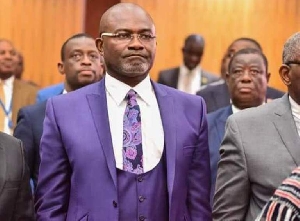The latest World Economic Outlook figures by the IMF show that our per capita GDP for 2018 is $1,780 per year or about $148 per month (or GHC 650 per person per month). In the West and elsewhere outside Africa, senior civil servants and high level political appointees receive incomes that are small multiples of the per capita income – about 3 to 5 times. The reason is that there is the need to allocate the national cake among all the productive sectors of the economy as well as develop public goods like transportation, schools, hospitals, sewage and drainage, etc.
For example, in the United States, the per capita GDP for 2018 is about $62,150 per year. US pays its Congressmen $174,000 per year, a little less than 3 times that country’s per capita income. Congressmen don’t have government vehicles and don’t have government accommodation. They use some of their salaries to acquire these needs just like the rest of us do. If Ghana were to do the same, each MP would receive a salary of about $5,340 per year or about GHC 2000 per month, and use that amount to pay for rent, car loan etc.
Salaries for public sector workers in the USA are much lower (as a multiple of the per capita GDP) than their counterparts in Ghana. This enables the USA to allocate a significant amount of their national income to those at the bottom of their society in the form of welfare transfers, free healthcare, free education for all up to SHS level, free public transportation for the poor. In Ghana, on the other hand, there are millions in the rural areas and the poor areas of the major cities who live in abject poverty, because a disproportionately large portion of the national income is paid to those who work at the high levels in the public sector.
Yes, Ghana is different from the USA and other countries, but if we spend all our money on the few senior public sector employees, there will be nothing left for the millions in the villages and the poor urban areas. The result is what we see – abject poverty for millions of our people! What is a realistic salary structure for Ghana? I believe that the relative salaries of different classes of public sector workers can be the same in Ghana and the USA. There is no reason why the ratio of an MP’s (Congressman’s) salary to a teacher’s salary should be different between Ghana and the USA. If a Congressman receives 4 times a teacher’s salary in the US, an appropriate salary for an MP in Ghana could be 4 times the average Ghanaian teacher’s salary. Let’s explore this further.
Let’s start from, say, teachers. The average salary of a teacher in the US is less than the per capita income. In Ghana, let’s say the teacher’s salary is about two times the per capita income, or about GHC 1,300 per month. Then, the salary of the MP should be about 4 times the teacher’s salary, or GHC 5,200 per month. Both the teacher and the MP should use their salary to rent accommodation, buy a car or pay for public transportation etc. just like everyone else does. The salaries of all other public sector workers will be appropriately determined. For example, the police on average will receive salaries that are about the same as school teachers; Engineers and Accountants in the public sector and similar workers will have salaries of about GHC 2000 to GHC 4000; Medical Doctors and University Lecturers will receive on average GHC 5,000 to GHC 7,000. There should be NO FREE ACCOMMODATION, NO FREE CARS, NO FREE GARDEN BOY etc for any public sector employee except the President, Vice President, and Speaker of Parliament. The US President receives about 8 times the average salary of a teacher. That will mean a salary of about GHC 10,400 for our President. The CEOs of the public sector agencies should also receive salaries commensurate with our productivity. Their maximum salaries should be about GHC 12,000. Some of these CEOs can receive salaries a little higher than that of the President because they will not get the freebies that the President gets (free housing, car, etc).
If we do this, there will be money left to provide equipment for our hospitals and schools, and we can provide efficient drainage and sewage systems, build high quality highways and provide efficient public transportation for all our citizens, and high quality healthcare for all.
Ghanaians who find these public sector salaries too low for themselves will be attracted to the private sector and find ways to innovate and create products in demand for the society. This will expand the private sector and lead to higher rates of employment for our youth. It will also result in competition in the private sector leading to higher quality products and, eventually, higher standards of living. Of course, none of these will work if we don’t close corruption loopholes and severely punish corruption. But if we create an orderly society that strengthens institutions and severely punishes corruption, there will be efficient allocation of capital which will result in our brilliant and hardworking minds moving to the private sector to create value-added products of high demand in society. The result will be a higher standard of living for all our people.
Some will say these salaries are too low. Actually they are not! You see, if all the people are receiving their commensurate salaries, prices will not be too high and goods will be supplied in abundance. Our farmers can buy the same things that our public officers can buy. Most will not be able to afford high priced items like private cars, but we will be able to develop highly efficient public transportation, our roads will be of high quality and most of us will ride in trains and buses that run on time. Home prices will come down and more affordable homes will be built.
We are quick to point out Singapore as a model but we don’t want to do what they did to get to where they are now. In Singapore, public transportation is highly efficient and inexpensive; very few people own and drive cars. The high taxes on private cars enables the government to keep very few cars on their roads, but the flip side is that public transportation runs almost perfectly. Who needs a car in such an environment anyway?
Opinions of Tuesday, 24 April 2018
Columnist: Charles E. Appeadu















